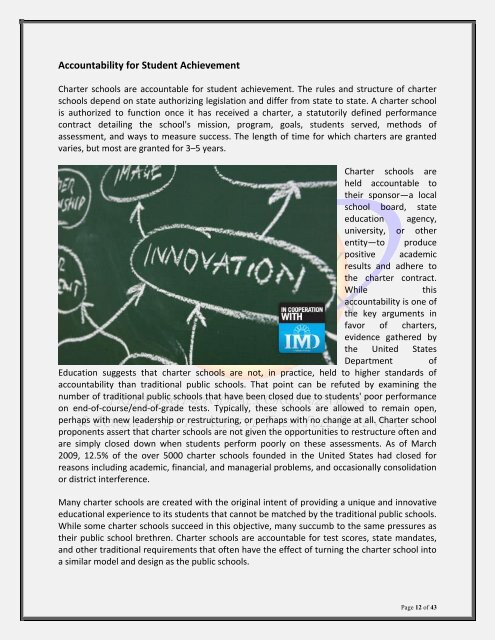The 21st Century Charter Schools Initiative
The 21st Century Charter Schools Initiative
The 21st Century Charter Schools Initiative
Create successful ePaper yourself
Turn your PDF publications into a flip-book with our unique Google optimized e-Paper software.
Accountability for Student Achievement<br />
<strong>Charter</strong> schools are accountable for student achievement. <strong>The</strong> rules and structure of charter<br />
schools depend on state authorizing legislation and differ from state to state. A charter school<br />
is authorized to function once it has received a charter, a statutorily defined performance<br />
contract detailing the school's mission, program, goals, students served, methods of<br />
assessment, and ways to measure success. <strong>The</strong> length of time for which charters are granted<br />
varies, but most are granted for 3–5 years.<br />
<strong>Charter</strong> schools are<br />
held accountable to<br />
their sponsor—a local<br />
school board, state<br />
education agency,<br />
university, or other<br />
entity—to produce<br />
positive academic<br />
results and adhere to<br />
the charter contract.<br />
While<br />
this<br />
accountability is one of<br />
the key arguments in<br />
favor of charters,<br />
evidence gathered by<br />
the United States<br />
Department of<br />
Education suggests that charter schools are not, in practice, held to higher standards of<br />
accountability than traditional public schools. That point can be refuted by examining the<br />
number of traditional public schools that have been closed due to students' poor performance<br />
on end-of-course/end-of-grade tests. Typically, these schools are allowed to remain open,<br />
perhaps with new leadership or restructuring, or perhaps with no change at all. <strong>Charter</strong> school<br />
proponents assert that charter schools are not given the opportunities to restructure often and<br />
are simply closed down when students perform poorly on these assessments. As of March<br />
2009, 12.5% of the over 5000 charter schools founded in the United States had closed for<br />
reasons including academic, financial, and managerial problems, and occasionally consolidation<br />
or district interference.<br />
Many charter schools are created with the original intent of providing a unique and innovative<br />
educational experience to its students that cannot be matched by the traditional public schools.<br />
While some charter schools succeed in this objective, many succumb to the same pressures as<br />
their public school brethren. <strong>Charter</strong> schools are accountable for test scores, state mandates,<br />
and other traditional requirements that often have the effect of turning the charter school into<br />
a similar model and design as the public schools.<br />
Page 12 of 43

















